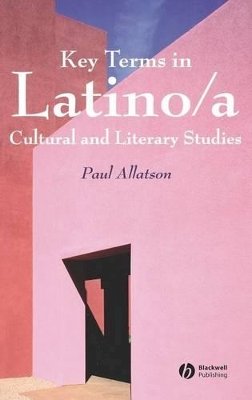
Stock image for illustration purposes only - book cover, edition or condition may vary.
Key Terms in Latino/a Cultural and Literary Studies
Paul Allatson
€ 151.43
FREE Delivery in Ireland
Description for Key Terms in Latino/a Cultural and Literary Studies
Hardback. Key Terms in Latino/a Cultural and Literary Studies is an indispensable reference source comprised of hundreds of key terms central to this important and developing field. Num Pages: 296 pages, black & white illustrations. BIC Classification: JFC. Category: (P) Professional & Vocational. Dimension: 235 x 160 x 21. Weight in Grams: 544.
Key Terms in Latino/a Cultural and Literary Studies is an indispensable reference source comprised of hundreds of key terms central to this important and developing field.
- A one-stop resource for students and teachers working in the rapidly developing fields of Latino/a cultural and literary studies
- Comprised of a glossary of hundreds of terms central to this important field - from "Americanization", "AIDS" and "Cultural Imperialism" to"Rap and Hip Hop" and "Zoot-Suit Riots"
- Represents and captures the interdisciplinary and international nature of Latino/a Studies
- An indispensable reference for anyone who needs a helpful guide to this dynamic and flourishing area of study.
Product Details
Format
Hardback
Publication date
2006
Publisher
John Wiley and Sons Ltd United Kingdom
Number of pages
296
Condition
New
Number of Pages
304
Place of Publication
Hoboken, United Kingdom
ISBN
9781405102506
SKU
V9781405102506
Shipping Time
Usually ships in 7 to 11 working days
Ref
99-50
About Paul Allatson
Paul Allatson teaches in and coordinates the Latino USA and Spain International Studies Degree programs at the Institute for International Studies, University of Technology, Sydney. He is author of Latino Dreams: Transcultural Traffic and the US National Imaginary (2002), and chief editor of the multilingual PORTAL Journal of Multidisciplinary International Studies.
Reviews for Key Terms in Latino/a Cultural and Literary Studies
?Allatson?s Key Terms will be useful for any Latino/a studies course, and could be used effectively as a pedagogical starting point for building a class glossary. However, it also provides a timely resource for Latino/cultural and literary studies by engaging current scholarly conversations while also inviting probing questions about what comes next for the field.? (Latino Studies, October 2009) ... Read more
